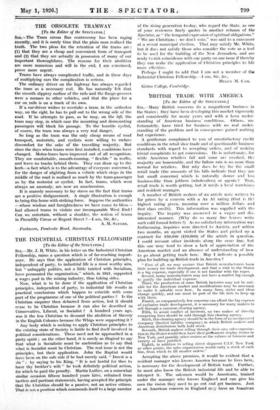THE INDUSTRIAL CHRISTIAN FELLOWSHIP . .
[To the Editor of the SPECTATOR.] SIR,—Mr. J. B. White, in his letter on the Industrial Christian Fellowship, raises a question which is of far-reaching import- ance. He says that the application of Christian principles, independent of party, to industrial life is a most worthy aim, but " unhappily politics, not a little tainted with Socialism, have permeated the organization," which, in 1921, supported
a wages pool in the mining industry, thus taking sides. .
Now, what is to be done if the application of Christian principles, independent of party, to industrial life results in practical conclusions which happen to coincide with some part of the programme of one of the political parties ? Is the Christian enquirer then debarred from action, lest it should cease to be Christian because it can also be described as Conservative, Liberal, or Socialist ? A hundred years ago, was it the less Christian to demand the abolition of Slavery in the English Colonies because the Whigs were supporting it ? ' Any body which is seeking to apply Christian principles to the existing state of Society is liable to find itself involved in political considerations. These need not be approached in a party spirit ; on the other hand, it is surely as illogical to say that what is Socialistic must be unchristian as to say that what is Socialist must be Christian. The real issue is not the principles, but their application. John the Baptist would have been on the safe side if he had merely said, " Incest is a sin " ; by saying to his King, " It is not lawful for thee to have thy brother's wife " he took definitely political action, for which he paid the penalty. Martin Luther, on a somewhat similar occasion fifteen htindred years later, refrained from tactless and partisan statements, having accepted the principle that the Christian should be a passive, not an active citizen. That is not a position which commends itself to a large number
of the rising generation to-day, who regard the State, as one of your reviewers finely quotes in. another column of the Spectator, as " the temporal expression of spiritual obligations." " We are Christians ; we don't vote," was said to a canvasser at a recent municipal election. That may satisfy Mr. White, but it does not satisfy those who consider the vote as a tool to be used for the building of the New Jerusalem, and are ready to risk coincidence with one party on one issue if thereby they can make the application of Christian principles to life more effective.
Perhaps I ought to add that I am not a member of tha Industrial Christian Fellowship.—I am, Sir, &c.,














































 Previous page
Previous page